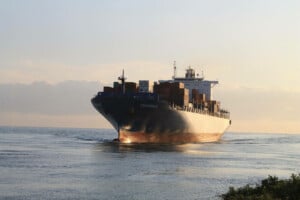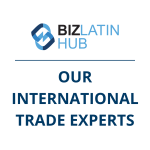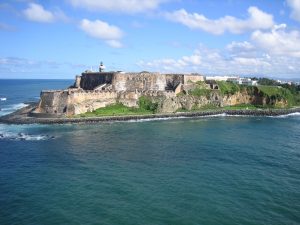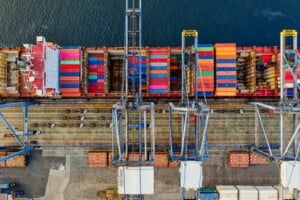
Chile became the 31st member of OECD (Organisation for Economic Cooperation and Development) in 2010. According to the OECD database, Chile’s GDP per capita was USD$24,013 in 2017, making it the wealthiest economy in South America in terms of GDP per capita. Read on if you are interested to know how International Trade in Chile works.
Chile is a country rich in natural resources including mineral reserves and agriculture. The most significant are the reserves of copper and lithium, making Chile the 28th largest global producer of copper, and possessing 56% of the world´s lithium reserves.
International Trade in Chile: Some Facts
Chile has a well-established trade network, with Chile´s top 10 most exported commodities amounting to 84,3% of overall exports. The Chilean economy is heavily dependent on the export of copper, with the state-owned company CODELCO being the largest producer of copper in the world.
The most significant export commodities, apart from copper, include ores, fish, fruits and nuts, wood pulp, beverages, wine, inorganic chemicals, precious metals, and meat. Precious metals are the fastest-growing export category. Chile has high sales of gold and silver, with the region seeing an increase in sales of 38.8% from 2016 to 2017. Chile’s main export partners include China, the United States, Japan, South Korea, and Brazil.
In contrast to the exports, the import market situation is more diversified. The top 10 Chilean imports amount to approx. 2/3 of the overall imports (around 65%). The most imported commodities are mineral fuels (over 15% of overall imports), machinery products (including computers), vehicles, and electric machinery and equipment.
The Chilean economy is classified as open/free, meaning that it is highly dependent on international trade. For example, an indicator of this high dependency on foreign trade is the ‘Trade-to-GDP’ ratio. According to the World Bank Study, foreign trade in Chile accounts for 56% of its GDP.
Being one of the market leaders in both South and Latin America, Chile certainly owes its strong position to numerous strategic international agreements. Chile has signed 26 international trade agreements and treaties regarding double taxation.
International trade in Chile is particularly interesting because it has 15 Free Trade Agreements (FTAs), including with the following countries and regions:
- Mercosur
- European Union
- EFTA
- Transpacific Strategic Economic Partnership (P4)
- Transpacific Partnership (TPP)
- Pacific Alliance
- Partial Association Agreement (India)
Legal Import Processes
Chile has an open market economy with numerous trade agreements aiming to make international trade simpler and cheaper. Nevertheless, before entering the Chilean market, it is beneficial to know what the import requirements are, and which products are restricted for importation purposes. Tailored legal services can be very beneficial in order to fully understand the local market and to identify viable business opportunities.
Importation Requirements in Chile
For the most part, the Chilean economy is very liberal and international trade in Chile is incentivized. You can import any kind of good so long as the government does not specifically prohibit it. For example, you cannot import used vehicles, used motorcycles, goods threatening the health of humans, animals, or toxic industrial waste.
Most physical persons and legal entities can carry out import transactions in Chile.
The authority for all customs-related matters in Chile is the National Customs Service. The legal framework regulating the area of customs procedures is the Customs Ordinance or the Institutional Customs Law.
There are two categories for the import of merchandise:
- Merchandise goods free on board (FOB) that do not exceed the value of US$1,000.
- Merchandise goods free on board (FOB) which exceed the value of US$1,000.
Any foreign merchant can freely import the merchandise from the first category. On the other hand, for the imports from the second category, the importer must hire a local customs agent. The customs agent must be of Chilean nationality and is accredited by the National Director of Customs.
International Trade in Chile: Documents Required by Customs to Import Goods
To import merchandise for which value does not exceed USD$1,000, you will need the following documents:
- Entry summary declaration.
- Original Bill of Lading (for maritime shipment), Consignment Note (for road transport), and Airway Bill (for air transport). These guarantee the existence of the contract between exporter and shipping company. They also serve as receipts of the goods and declaration for customs clearance.
- Original commercial invoice- attesting the subject to sale and its value.
- Power of attorney of the importer to a third party.
- Certificate of Free Sale (Sanitary and Phytosanitary certificate)- for agricultural and food products.
- Travel Certificate issued by International Police- only for importing traveller´s luggage.
For international trade in Chile, specifically importing merchandise products exceeding the value of USD$1,000, the following documents are necessary:
- Entry summary declaration.
- Importer affidavit on the price of merchandise.
- Bill of Lading, Consignment Note and/or Airway Bill.
- Original commercial invoice,
- Endorsement of the original Bill of Lading on behalf of the customs agent in order to allow for the clearance of goods.
- Insurance certificate (In the case that is not included in the commercial invoice).
- Expense claims including all expenses which are not included on the website.
- Permits, visas, certificates or clearances when necessary.
- Packaging list for grouped merchandise or for merchandise packed in containers.
- Sanitary and phytosanitary certificate (for agricultural and food products).
- Import authorization.
- Certificate of Origin – certifying the country of origin where the merchandise is produced.
- Certificate of Insurance.
- Expense claims.
- Proof of origin – for imports between Chile and the European Union.
Chilean Import Taxes and Tariffs

Chile adopted the Harmonized Customs System which is an internationally standardized system developed by the World Customs Organization (WCO).
Chilean imports are subject to the payment of the ad-valorem duty or tariff that is calculated on the CIF value (cost of goods + insurance coverage + freight transfer value). Since the 1st of January 2013, Chile applies a general tariff of 6% on most products, making it one of the lowest tariffs in Latin America.
All imported products must pay a VAT (Value-Added-Tax) based on the CIF value plus the ad-valorem duty. Some selected products must pay higher excise duty (e.g. tobacco, luxury goods, or alcoholic beverages).
Regional trade agreements or treaties can ensure exemption from ad-valorem tariffs or preferential rates. For example, all imports to Chile from The EU enter tariff-free.
International Trade in Chile: Exportation Requirements
There is some important information which you need to know if you want to export from Chile. Primarily, you have to register the legal entity (the company) that will export the products. Secondly, you need to clear all the goods ready for export by the customs office. And thirdly, you must submit an export declaration certificate to the customs office. Unlike the imports, you do not pay VAT nor customs for exports.
There are two categories of export of merchandise products:
- Export of merchandise goods exceeding USD$1,000
- Export of merchandise goods not exceeding USD$1,000
If the value of exported merchandise commodities exceeds USD$1,000, the exporter must submit a DUS (Documento Unico Salida) or an embarkation order.
Need more Information?
To learn more about the Chilean economy, the business opportunities to form a company in Chile, and how you might take advantage of these political shifts, please contact us today.
Check out the video below and see how our support services can assist your Latin America market entry.






